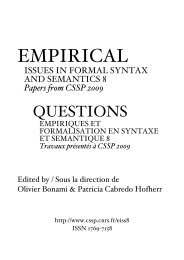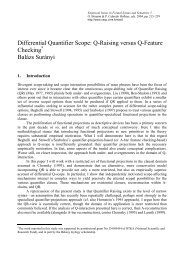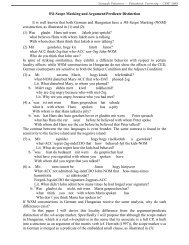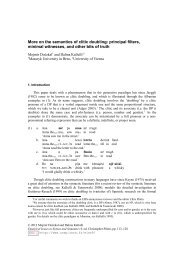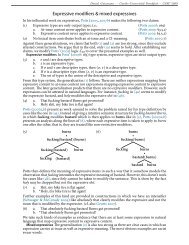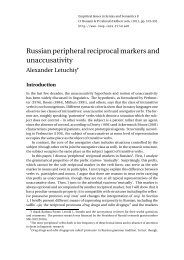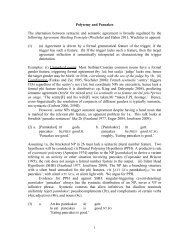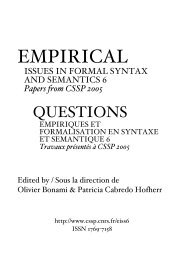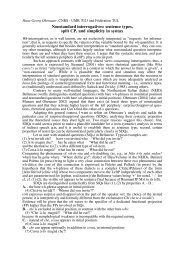Empirical Issues in Syntax and Semantics 9 (EISS 9 ... - CSSP - CNRS
Empirical Issues in Syntax and Semantics 9 (EISS 9 ... - CSSP - CNRS
Empirical Issues in Syntax and Semantics 9 (EISS 9 ... - CSSP - CNRS
Create successful ePaper yourself
Turn your PDF publications into a flip-book with our unique Google optimized e-Paper software.
to the pr<strong>in</strong>ciple <strong>in</strong> (39), which aims to capture a rule of behavior like ‘If you truly do not care<br />
whether g, <strong>and</strong> you know that someone else prefers g, then act as though you prefer g, as well.’<br />
(39) COOPERATION BY DEFAULT<br />
An agent A is cooperative-by-default iff he adds any topical goal g of another agent<br />
to his effective preference structure, such that for any preference structure P A : for no<br />
p ∈ P A : p < g.<br />
It is important to realize how weak (39) is. The preference for g will be bounded by other<br />
preferences the agent happens to have, <strong>and</strong> so <strong>in</strong> the event of conflict<strong>in</strong>g preferences a ‘bottomlayer’<br />
preference that gets added on another’s behalf will be <strong>in</strong>active. For <strong>in</strong>stance, by utter<strong>in</strong>g<br />
the imperative <strong>in</strong> (9) B does not commit to do<strong>in</strong>g everyth<strong>in</strong>g <strong>in</strong> his power to get A to San<br />
Francisco, because the preference for A gett<strong>in</strong>g to San Francisco will be bounded by other<br />
preferences of B for not go<strong>in</strong>g to San Francisco without a personal reason.<br />
On the other h<strong>and</strong>, suppose that an agent truly does not care whether some other agent’s<br />
goal g gets realized (like B <strong>in</strong> (9), presumably). In this case, even though g is added ‘at the<br />
bottom’ of the preference structure (g is not ranked above any other member of the preference<br />
structure), there is noth<strong>in</strong>g prevent<strong>in</strong>g g from be<strong>in</strong>g a maximal element: this is why, if a speaker<br />
is truly dis<strong>in</strong>terested, he can give advice by means of an imperative. If the addressee goal g has<br />
become an effective preference of the speaker by (39), then <strong>in</strong> view of the speaker’s utterance of<br />
the imperative φ! as a contribution to the issue of how to realize g, the addressee may <strong>in</strong>fer that<br />
a possible reason for the speaker’s preference for φ is that realiz<strong>in</strong>g φ is a way for realiz<strong>in</strong>g<br />
g. 10 We predict, then, that dis<strong>in</strong>terested advice uses are possible just <strong>in</strong> case the speaker does<br />
not have a preference of any k<strong>in</strong>d for either φ or ¬φ. This is why, as seen <strong>in</strong> (40), not only<br />
but I don’t want you to do it follow-ups are <strong>in</strong>felicitous, but also but I wish you would not, <strong>in</strong><br />
contrast to what we observed for concessions, as <strong>in</strong> (22).<br />
(40) A: How will I get to San Francisco?<br />
B: Take the tra<strong>in</strong>. #But you know how dangerous I th<strong>in</strong>k this is, so I don’t want you to<br />
take it/I wish you would not.<br />
B’s utterance of the imperative <strong>in</strong>dicates that A’s goal of gett<strong>in</strong>g to San Francisco <strong>and</strong> the particular<br />
way of do<strong>in</strong>g so have become maximal effective preferences of B’s. But the stated preference<br />
of B aga<strong>in</strong>st A tak<strong>in</strong>g the tra<strong>in</strong> implies that B would prefer another way for A to achieve his goal,<br />
<strong>in</strong> which case A tak<strong>in</strong>g the tra<strong>in</strong> is not maximal. Or if there is no other way, A’s goal of gett<strong>in</strong>g<br />
to San Francisco would not have become B’s maximal effective preference to beg<strong>in</strong> with.<br />
F<strong>in</strong>ally, let us consider cases where the speaker secretly has an effective preference for the<br />
opposite of the addressee’s goal. Suppose A asks the question <strong>in</strong> (40), B secretly wants A to not<br />
go <strong>in</strong> that direction, say <strong>in</strong> order to throw him off the tracks of someone A wants to protect, <strong>and</strong><br />
hence replies Take the Southbound tra<strong>in</strong>! B’s utterance is (<strong>in</strong>tentionally) mislead<strong>in</strong>g because he<br />
implies that the Southbound tra<strong>in</strong> is a way of gett<strong>in</strong>g to San Francisco. However, the imperative<br />
utterance is not a lie about A’s effective preferences. Hence, contrary to Kaufmann’s (2012:69–<br />
70) construal of such cases, the imperative utterance itself, though mislead<strong>in</strong>g, is not <strong>in</strong>s<strong>in</strong>cere.<br />
Group III: Permissions, <strong>in</strong>vitations In cases of a power asymmetry between speaker<br />
<strong>and</strong> addressee, the speaker’s PEPs can be thought of as determ<strong>in</strong><strong>in</strong>g the ‘sphere of permissibil-<br />
10 That is, the addressee assumes the speaker’s preference for φ is the result of practical reason<strong>in</strong>g by the speaker<br />
<strong>and</strong> recovers the premise of a means-of relation between φ <strong>and</strong> g <strong>in</strong> this practical reason<strong>in</strong>g.<br />
50



